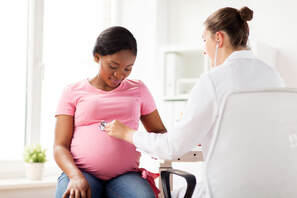 An OBGYN will recommend certain meds during pregnancy Your OBGYN in Atlanta and Alpharetta GA does not want you taking the same meds that you took before you were pregnant. When you’re pregnant, your OBGYN will inform you that your immune system won’t be operating at its maximum capacity; this can be a good thing because it will keep your growing baby protected and prevents your body from thinking your fetus is an intruder. But this comes with a downside; your body won’t be able o ward off viruses that can cause the common cold as effectively as usual. This will cause your body to become more vulnerable to symptoms such as cough, congested nose, and sore throat. You can possibly find yourself coming down with a cold now that cold and flu season is here, and while you can be assured that your baby will not be experiencing any symptoms, you may want to get rid of them safely and quickly for yourself. A cold is mostly an uncomfortable annoyance that is best managed by fluids, a little extra rest, and patience; however, you may find that you want to see some cold medications that can help to alleviate your cold symptoms. Your OBGYN will help you to find the proper cold medicines that are safe to use during your pregnancy. Safe medications during pregnancy for a cold Before searching through your medicine cabinet, pick up the phone and call your OBGYN to discuss any remedies that you can take for a cold while you’re pregnant. Here are some cold medications that are generally safe during your pregnancy: Acetaminophen: Taking acetaminophen medication such as Tylenol can help to reduce body and headaches and break your fever for the short term. Cough medicine: You should consult with your OBGYN to determine what the safe dosages are. But, cough suppressants such as Robitussin, expectorants like Mucinex, vapor rubs such as Vicks VapoRub, and cough drops are considered to be safe to use during your pregnancy. Nasal sprays: Plain saline sprays and drops are safe and can help you to clear and moisturize your stuffy nose. Most nasal sprays that contain steroids are also safe, but you should always check with your doctor about the dosing and brands. Antihistamines: Claritin and Benadryl are typically safe to use during your pregnancy. But, as usual, consult with your doctor and see if they advise against their use during your first trimester. Natural remedies Natural remedies such as nasal irrigations, humidifiers, nasal strips, and elevating your body when sleeping are also options for you to consider. You can also try keeping yourself hydrated with decaffeinated teas such as chamomile or ginger. Top OBGYN in Atlanta and Alpharetta GA here for you Communicating with your OBGYN will be critical to determine which medications are safe for you to take and which ones that you should be avoided during your pregnancy. Your OBGYN’s office may have a helpline for you to call between your appointments if you have any concerns or questions. Contact your top Alpharetta and Atlanta OBGYN for your obstetrics and gynecology care.
0 Comments
11/21/2021 0 Comments Best gynecologist in Atlanta and Alpharetta, GA, discusses the various types of ovarian cysts What can a gynecologist tell you about the different types of ovarian cysts? A gynecologist in the Atlanta and Alpharetta GA area can help diagnose the different variations of cysts that can be non-cancerous, cancerous, or become cancerous over time. Lots of ovarian cysts will go away on their own, and you may not require any treatment or experience any of its symptoms. But, some of these cysts may need to be removed through surgery. What is an ovarian cyst? Ovarian cysts are fluid-filled or solid pockets that are found in or around your ovary. Cysts are common, especially in women who have not gone through menopause or who are pregnant. Many ovarian cysts are harmless and painless. They can even be a portion of your menstrual cycle every month, and you may never know it. They will usually go away without the need for any treatment. A cyst can become a problem if it does not go away on its own or becomes more prominent in size. This can make a cyst painful. There is also the possibility that an ovarian cyst can become cancerous. However, this is rare. But the chances of this happening will go up as you age. Different types of ovarian cysts At some point in their lives, a lot of women will develop an ovarian cyst. An ovarian cyst is one of the most common reasons a woman will look for a gynecologist to have a consultation. Different forms of ovarian cysts can occur, including: Functional cysts: Most ovarian cysts form as a natural result of the menstrual cycle during your reproductive years. Your ovaries will grow small follicles leading up to ovulation, and these follicles expel the egg and releases hormones during your ovulation. Sometimes, after your menstrual cycle, a normal follicle will continue to retain fluid and grow; this is what’s known as a functional cyst. They typically shrink and fade away on their own between four to eight weeks and are almost always harmless. Benign neoplastic cysts: These cysts present themselves in various forms and are rare. They are characterized by an abnormal amount of tissue growth. Cystic teratoma is the most common form of benign neoplastic cysts and is also referred to as a dermoid cyst; and can develop from a germ cell and can contain multiple forms of tissue, including skin cells sebaceous glands, or hair follicles. Occasionally these cysts can cause pelvic pain and other medical complications; however, sometimes, they can cause no symptoms. Benign neoplastic cysts usually do not resolve on their own. Endometriotic cysts: These cysts develop as a result of endometriosis and can develop when endometrial like-tissues grow outside of your uterus and can attach themselves to your ovaries. During your menstrual cycle, your hormones will trigger your uterine tissue to start to shed after ovulation and exit your body. However, the endometrial tissues on your ovaries can’t be shed, and this can cause the tissues to build up and form a reddish-brown, dark cyst. This is why endometriotic cysts are referred to as “chocolate cysts.” Endometriotic cysts usually don’t resolve themselves spontaneously, and if they are ruptured, they can cause adhesions, pelvic pain, and infertility. Top gynecologist in Atlanta and Alpharetta GA for ovarian cysts A gynecologist will instruct you on the best course of action to treat an ovarian cyst. This remedy will depend on various factors, including your age, if you’re past menopause, the size and appearance of your cyst after an ultrasound, and whether or not you have any symptoms. After a few months, many small cysts will resolve themselves. Your doctor may advise that you have ultrasound scans after a few months to monitor their size. No action will be needed if the cyst goes away. Contact your top Alpharetta and Atlanta OBGYN for your obstetrics and gynecology care. 11/6/2021 18 Comments Women’s health in Atlanta and Alpharetta GA: what to expect during a wellness exam Women’s health can be evaluated by an expert during a wellness exam A women’s health exam may be a little nerve-wracking when visiting your Atlanta or Alpharetta GA OBGYN. However, this is a quick and straightforward procedure that is essential to maintaining your overall health. When you understand why this annual wellness exam is necessary and what is involved during your assessment, you will begin to realize that there is nothing to be concerned or embarrassed about. This annual exam is done to allow your doctors to see your female organs to ensure and maintain your gynecological health. Why is an annual wellness exam necessary? It is vital not to delay scheduling your wellness exam appointment. Your first exam should be scheduled when you have become active sexually or when you have turned 21. You should also plan your exam if you have been experiencing any pelvic pain or menstrual irregularities. Your wellness exam is your first line of defense against female reproductive diseases, and it is the only way to find the early stages of cervical cancer. This is why it is so crucial to be diligent about scheduling your exam every year. What to expect during your wellness exam Here is what you can expect throughout your wellness exam appointment: First visit: Your first visit with your OBGYN is a great time to ask any questions that you have about your sexuality, menstrual cycle, and other questions about your reproductive health. This visit will typically include a physical exam and a review of your vitals, such as your height, weight, and blood pressure. Pelvic exam: A pelvic exam allows your doctor to evaluate your reproductive organs while also examining your internal and external vaginal region. During this exam, you will be lying on an examination table with your feet in stirrups. The doctor will then examine the outer area of your vagina; this includes the labia and vulva. Your doctor will be looking for any redness, swelling, irritation, or any visual indications of STDs. Pap smear: This screening will allow your doctor to check for any abnormal cells that would indicate any possibility of cervical cancer. Provided that no abnormalities are found, a pap smear can be repeated every three years up until the age of 29. If you are older than 30, you will benefit from testing for the human papillomavirus along with having a pap smear. Some strains of the human papillomavirus are known to cause cervical cancer. Breast exam: As a part of your wellness exam, your doctor will examine your breasts to check for discharge, lumps, or thickened tissues. This breast exam is not meant to replace a mammogram. Women’s health in Atlanta and Alpharetta, GA Your women’s health expert strongly recommends that you have your examination every year because it can be the difference between catching any problem sooner or having to undergo any treatment when the problem has advanced. Contact your top Alpharetta and Atlanta OBGYN for your obstetrics and gynecology care.  Top women’s health experts discuss options for natural pain remedies A women’s health expert in Atlanta and Alpharetta GA can help expecting mothers who are looking to have a natural childbirth. Giving birth is natural, but natural childbirth is the process of labor and delivery without using any anesthesia or medication. This will mean that you will be relying on natural methods of pain relief, such as breathing and visualization. There are good reasons to want to prepare yourself for natural childbirth. By deciding to have a natural childbirth, women have been more aware of the birth process by skipping the medication. Babies are more alert when medication is not used because there is no medication entering the baby’s bloodstream. Labor hurts, and everybody will have a different pain threshold. The good news is that there are many options for pain management that are available. Natural pain management options Here are the options that are available to you to help manage your pain during natural childbirth: TENS: A TENS machine is a device that uses electrodes that stick to your skin. They are typically attached to your lower back. The machine then sends an electric current throughout your body. This is safe for both you and your baby. TENS machines are not suitable for everyone. If you have a pacemaker, you should not be using one, and you should avoid using a TENS machine before 37 weeks gestation. Massage and reflexology: A massage may be helpful to get your muscles relaxed during childbirth. You will most likely need to try out a few variations of massage methods to see which one is right for you since there are many available variations. Reflexology is a process that is used to apply pressure to a specific area of your body. The main focus of reflexology is on your feet and how the nerve ending in your feet can be manipulated to help reduce pain and relieve tension. Water birth: A water birth is a gentle method because your labor and delivery will be in a soothing water-filled tub. The warm water helps you to relax and feel comfortable to help manage your pain. Sometimes women will labor in the water and leave the tub to deliver the baby, while others will give birth in the water. Several hospitals offer water birth, and if this method is suitable for you, you can rent or purchase a tub. However, this childbirth method is not recommended in the case of premature labor, breech presentation, and other complications with pregnancy. Women’s health in Atlanta and Alpharetta GA Women’s health experts have seen a rise in popularity for natural childbirth, but they are not suitable options for everyone who is expecting. Anesthetics are used to help relieve pain during your delivery, along with other modern techniques and medicines to keep both you and your baby safe during the entire process. Natural birth is not recommended for anyone who is experiencing a high-risk pregnancy. A high-risk pregnancy happens when the mother has a known medical condition that can interfere with the development or birth of their baby, including thyroid disorders, diabetes, uterine fibroids, and more. Contact your top Alpharetta and Atlanta OBGYN for your obstetrics and gynecology care. |
AuthorWrite something about yourself. No need to be fancy, just an overview. Archives
November 2021
CategoriesAll Alpharetta GA Atlanta GA Atlanta Women OBGYN Atlanta Women's OBGYN Best Gynecologist Best OB/GYN In Atlanta Gynecologist Gynecologists And Obstetricians Gynecology And Obstetrics OBGYN OBGYN Near Northside Hospital OBGYNs Near Northside Hospital Obstetrician Obstetricians Prenatal Care Gynecology Top Gynecologist Top OBGYN Top OBGYN Atlanta Top Obstetrician In Atlanta Women's Clinic Women's Health Women’s Health Women’s Health Women's OBGYN Women’s OBGYN Women’s OBGYN Women’s Obstetrics And Gynecology Women’s Obstetrics And Gynecology Women Specialists Women's Specialist Women’s Specialist Women’s Specialist Women's Specialists |
 RSS Feed
RSS Feed
